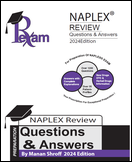
A pharmacist receives a new prescription for Meloxicam (Mobic). The prescription reads:
Take 7.5 mg by mouth every 8 hours with or without meals for the pain associated with rheumatoid arthritis x 30 days. Refill: 5 times.
Which of the following is True?
a. Fill it.
b. Call physician to clarify dosage strength.
c. Call physician to clarify indication of drug.
d. Call physician to clarify the frequency of dosing.
e. Change direction to take with meals after verifying with physician.
A pharmacist receives a new prescription for Meloxicam (Mobic). The prescription reads:
Take 7.5 mg by mouth every 8 hours with or without meals for the pain associated with rheumatoid arthritis x 30 days. Refill: 5 times.
Which of the following is True?
a. Fill it.
b. Call physician to clarify dosage strength.
c. Call physician to clarify indication of drug.
d. Call physician to clarify the frequency of dosing.
e. Change direction to take with meals after verifying with physician.
Answer: (d). Meloxicam (Mobic), an oxicam derivative, is a member of the enolic acid group of nonsteroidal anti-inflammatory drugs (NSAIDs). Each pastel yellow tablet contains 7.5 mg or 15 mg Meloxicam (Mobic) for oral administration.
Meloxicam (Mobic) is indicated for relief of the signs and symptoms of osteoarthritis, rheumatoid arthritis and pauciarticular or polyarticular course Juvenile rheumatoid arthritis in patients 2 years of age and older.
For the relief of the signs and symptoms of arthritis the recommended starting and maintenance oral dose of Meloxicam (Mobic) is 7.5 mg once daily since the mean elimination half-life (t½) ranges from 15 hours to 20 hours. Some patients may receive additional benefit by increasing the dose to 15 mg once daily. It may be taken without regard to timing of meals.
Nonsteroidal anti-inflammatory drugs (NSAIDs) may cause an increased risk of serious cardiovascular (CV) thrombotic events, myocardial infarction, and stroke, which can be fatal. This risk may increase with duration of use. Patients with cardiovascular disease or risk factors for cardiovascular disease may be at greater risk.
NSAIDs cause an increased risk of serious gastrointestinal (GI) adverse reactions including bleeding, ulceration, and perforation of the stomach or intestines, which can be fatal. These events can occur at any time during use and without warning symptoms. Elderly patients are at greater risk for serious gastrointestinal events.



